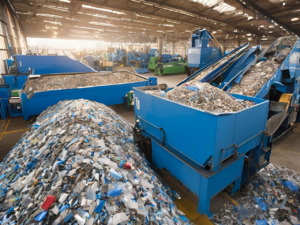South Africa is increasing its recycling capacity for the management of plastic waste and eliminating plastic pollution, says Deputy Minister of Forestry, Fisheries and the Environment Bernice Swarts.
“There are various activities aligned to the fight against plastics pollution and marine litter,” Swarts said on Monday in Cape Town during the International Solid Waste Association World Congress. South Africa has a combination of voluntary approaches aimed at tackling plastic pollution to the plastics industry, coupled with improved household and community waste disposal and the creation of the Extended Producer Responsibility (EPR) schemes. In 2020, government introduced the Extended Producer Responsibility Regulations which called for EPR schemes for plastic packaging and electrical and electronic equipment amongst other prioritised products. This circular economy and EPR initiatives have resulted in the formation of five registered extended producer schemes that support plastic waste collection and recycling. The EPR Regulations aim to influence product design to take environmental considerations into account and are currently being implemented for paper, packaging and some single use products, lighting, electrical and electronic products.“South Africa is also implementing product design regulations on prioritised plastic products. Recyclate content is a regulated requirement for prioritised plastic products as part of improving circularity,” Swarts explained.In 2023, government put a restriction of a minimum of 50% recycled content as part of the product design measures for plastic carrier bags. The intention is that by 2027, plastic carrier bags and black refuse bags should be made from 100% recycled material. “The Extended Producer Responsibility Regulations are a critical element of the considerations that are part of the international legally binding instrument on plastic pollution, currently being negotiated. “The International Solid Waste Association should remain resolute, in thought leadership by conducting specialists’ studies that will assist and inform negotiating positions at the Intergovernmental Negotiating Committee (INC) on Plastic Pollution and including the environment. In 2022, South Africa supported the development of an internationally legally binding instrument to combat plastic pollution at the Fifth Session of the United Nations Environment Assembly. “The fiscus is under a lot of pressure here in South Africa and across many other countries and thus the role of the private sector in reducing the burden and shouldering some of the responsibility is key. “Political will and commitment has seen the translation of the polluter pay principle into operational policies that create a conducive environment for private sector investment in waste management,” the Deputy Minister said. Article originally posted on SAnews.gov.za.







